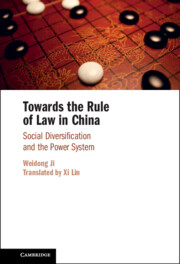Book contents
- Toward the Rule of Law in China
- Epigraph
- Toward the Rule of Law in China
- Copyright page
- Contents
- Foreword
- Acknowledgments
- Translator’s Note
- Abbreviations
- Introduction
- 1 The Conception of Law in Traditional China
- 2 The Essence of Modern Rule of Law
- 3 The Rule of Law: Contemporary Challenges and Paradigmatic Innovation
- 4 A Rule-of-Law Democracy (Rechtsdemokratie): Social Diversification and Reconstructing the System of Authority
- 5 Judicial Reform in China: The Status Quo and Future Directions
- 6 Reconstructing Legal Ideology
- Postscript
- Book part
- References
- Index
6 - Reconstructing Legal Ideology
Published online by Cambridge University Press: 24 February 2022
- Toward the Rule of Law in China
- Epigraph
- Toward the Rule of Law in China
- Copyright page
- Contents
- Foreword
- Acknowledgments
- Translator’s Note
- Abbreviations
- Introduction
- 1 The Conception of Law in Traditional China
- 2 The Essence of Modern Rule of Law
- 3 The Rule of Law: Contemporary Challenges and Paradigmatic Innovation
- 4 A Rule-of-Law Democracy (Rechtsdemokratie): Social Diversification and Reconstructing the System of Authority
- 5 Judicial Reform in China: The Status Quo and Future Directions
- 6 Reconstructing Legal Ideology
- Postscript
- Book part
- References
- Index
Summary
Generally speaking, ideology is as much a concept with a strong sense of politics, as a system of beliefs that is class-based, especially the ruling class. Nevertheless, Manheim’s redefinition of ideology from the perspective of the sociology of knowledge (Wissenssoziologie) has greatly expanded its connotations and extensions (Mannheim 1936, 2009). A wider conception of ideology can be put forward here, considering the sea changes occurring in China’s society and economic structures since reform and opening-up in 1978, as well as such ground-breaking statements made by the Chinese Communist Party during its Fourth Plenum of the Eighteenth Party Congress “to regulate and restrain public power” and “to improve the public credibility of the judiciary.” Ideology can be defined as principles, values, morality, political conceptions, or even scientific knowledge knitted together with utilitarian ends – all phenomena that can be used by groups and organizations to support their claims, with its scope extended to cover the communal spirit of the legal profession and the principles in legal doctrines.
- Type
- Chapter
- Information
- Towards the Rule of Law in ChinaSocial Diversification and the Power System, pp. 257 - 302Publisher: Cambridge University PressPrint publication year: 2022

